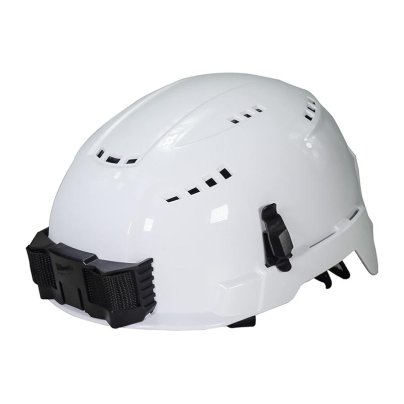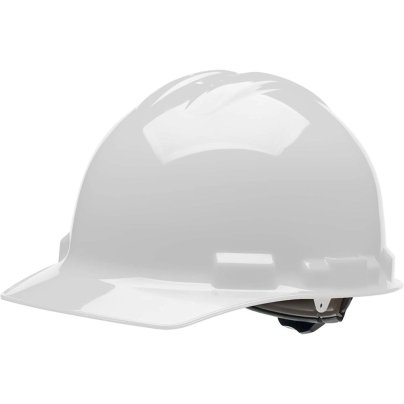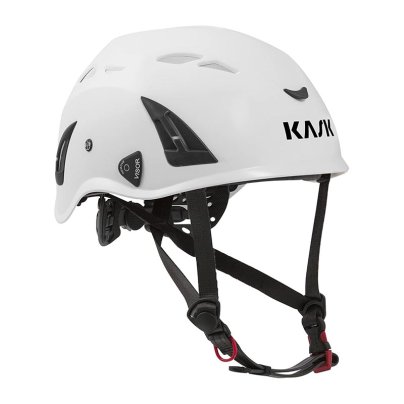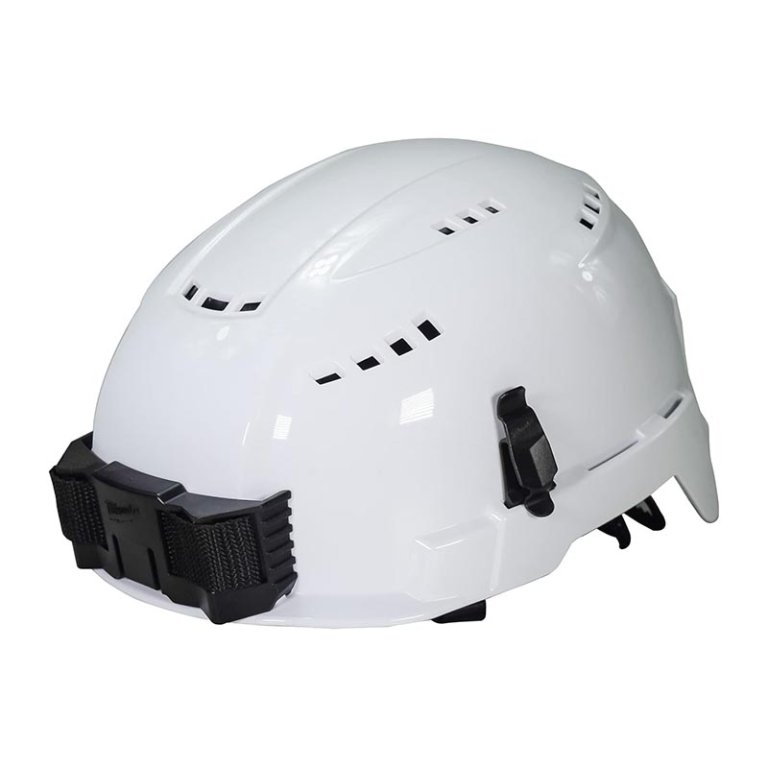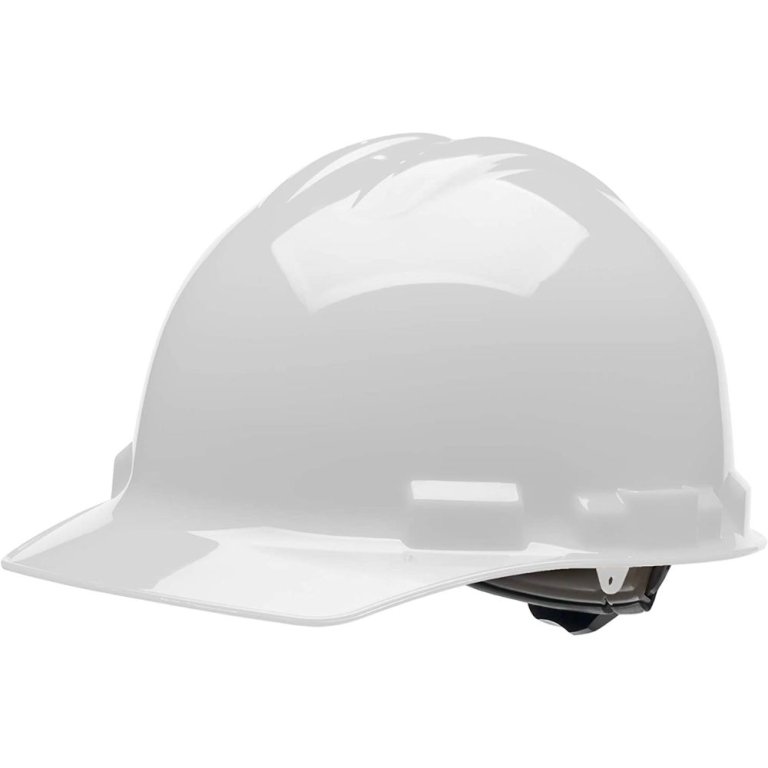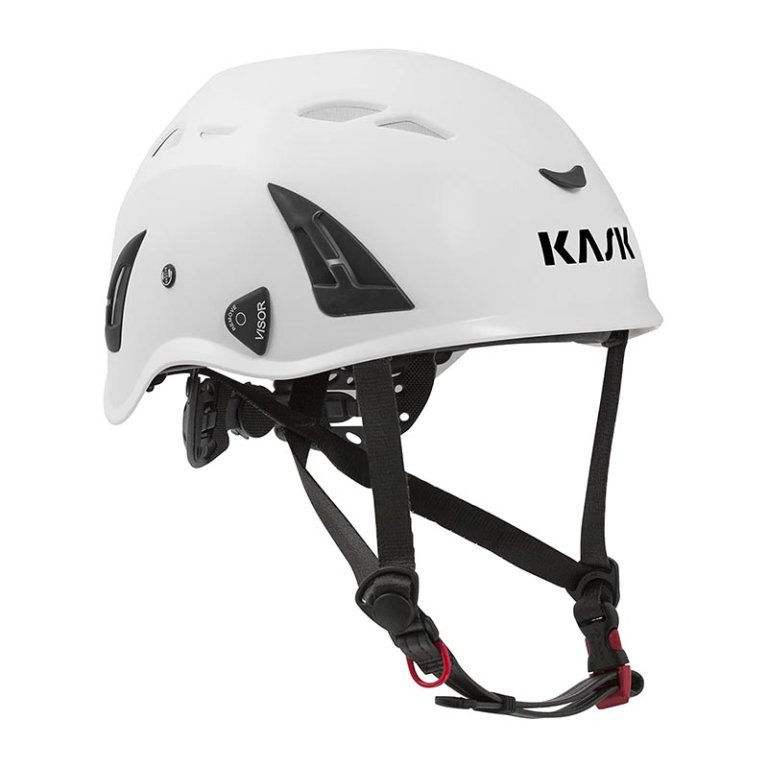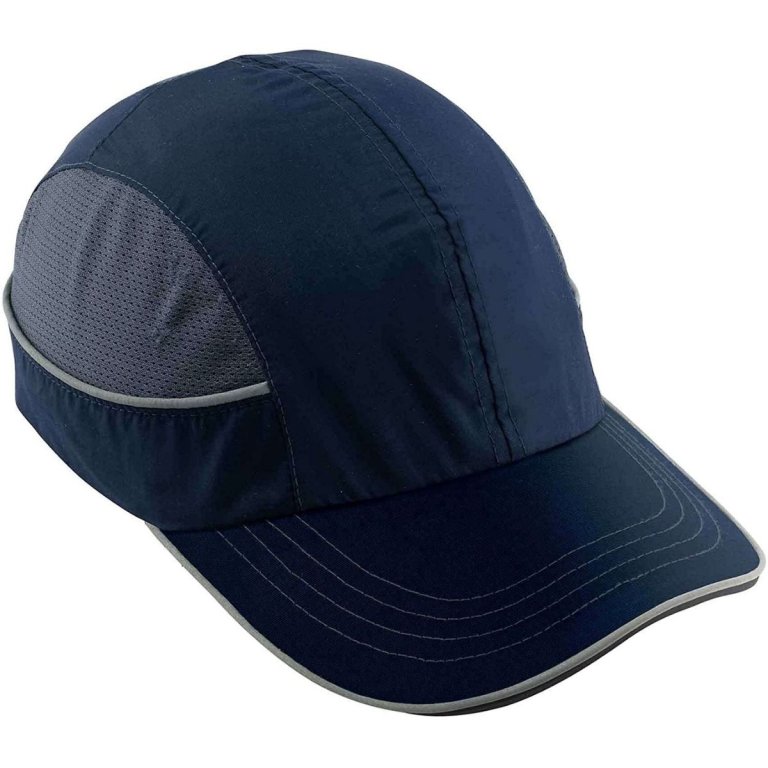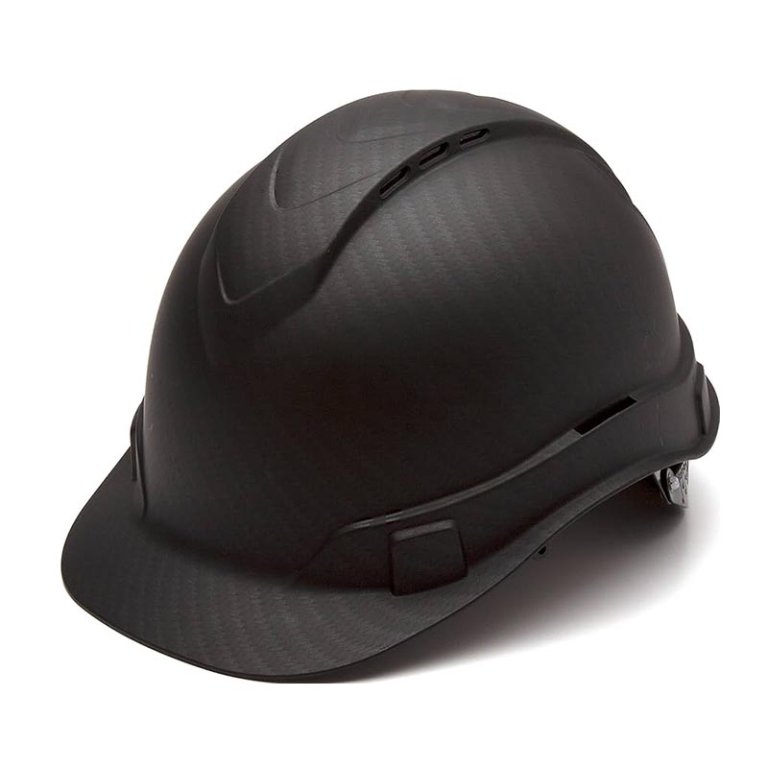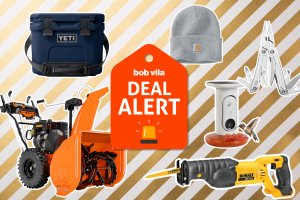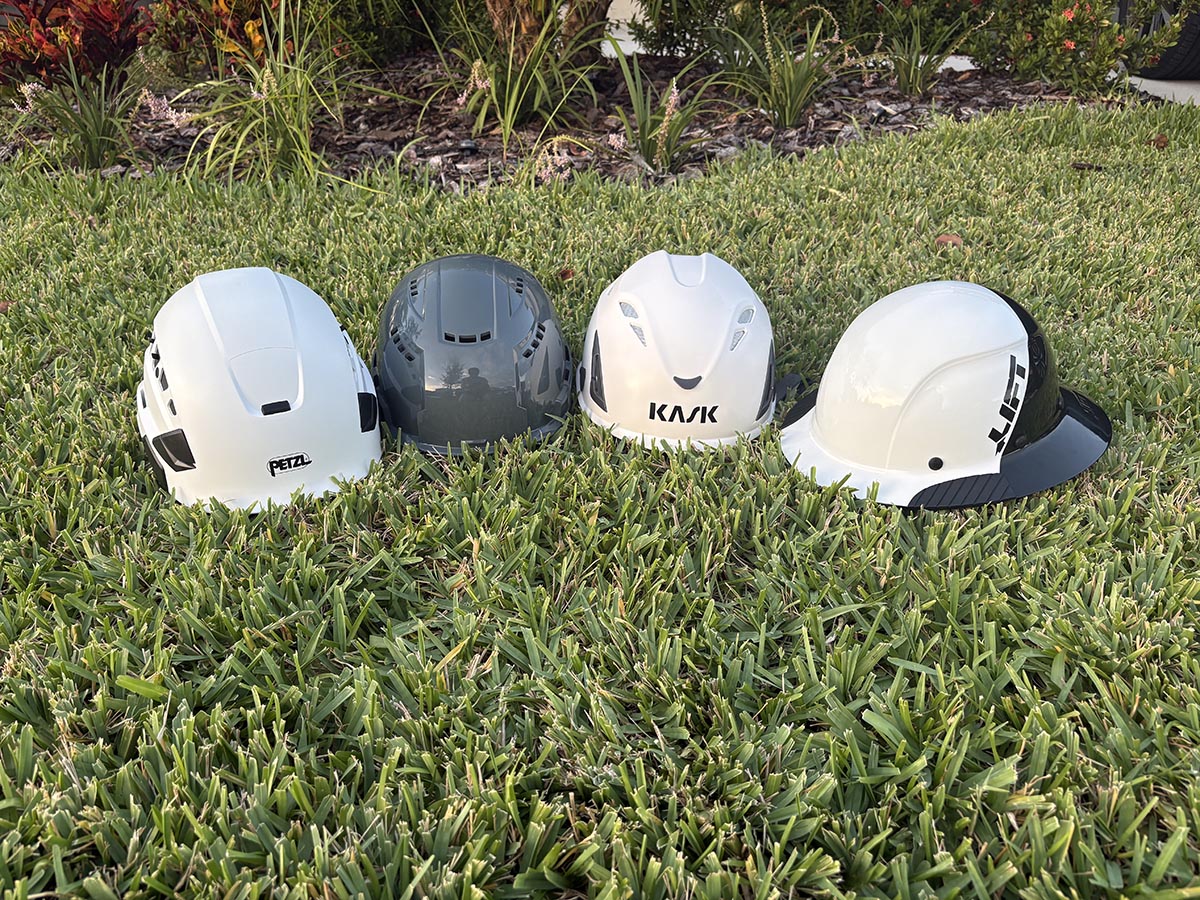
We may earn revenue from the products available on this page and participate in affiliate programs. Learn More ›
Hard hats are essential safety gear designed to protect against impact, falling debris, and electrical hazards on the jobsite. To find out which options truly deliver, we tested 13 different hard hats ourselves, wearing each for a full workday to evaluate comfort, adjustability, and overall protection.
Whether you’re a professional contractor or a DIY homeowner tackling heavy-duty projects, the right construction safety gear can make a huge difference, especially when it comes to hard hats. Poorly fitting models can be uncomfortable and distracting, while low-quality materials may not offer the level of safety you need. In our testing, the Milwaukee BOLT stood out as the top overall pick thanks to its balance of comfort, durable construction, and easy-to-use adjustment system. But other competitors won our stamp of approval, as well.
With so many classes, suspension types, and materials to choose from, shopping for the right head protection can be overwhelming. That’s why we’ve broken down the most important features and highlighted our favorite models to help make the decision easier. Keep reading for our complete guide to finding the best hard hat for your needs.
- BEST OVERALL: Milwaukee Bolt Vented Safety Helmet
↓ Jump to Review - BEST BANG FOR THE BUCK: Malta Dynamics 4-Point Ratchet Cap Style Hard Hat
↓ Jump to Review - BEST LIGHTWEIGHT: Kask Superplasma HD Safety Helmet
↓ Jump to Review - BEST BUMP CAP: Ergodyne Skullerz 8950 Bump Cap Hat
↓ Jump to Review - BEST FOR CONSTRUCTION: Pyramex Ridgeline Cap Style Hard Hat
↓ Jump to Review - BEST FULL-BRIM: Klein Tools 60407 Vented Hard Hat With Headlamp
↓ Jump to Review - BEST FOR SPORT: Petzl Vertex Vent Helmet
↓ Jump to Review
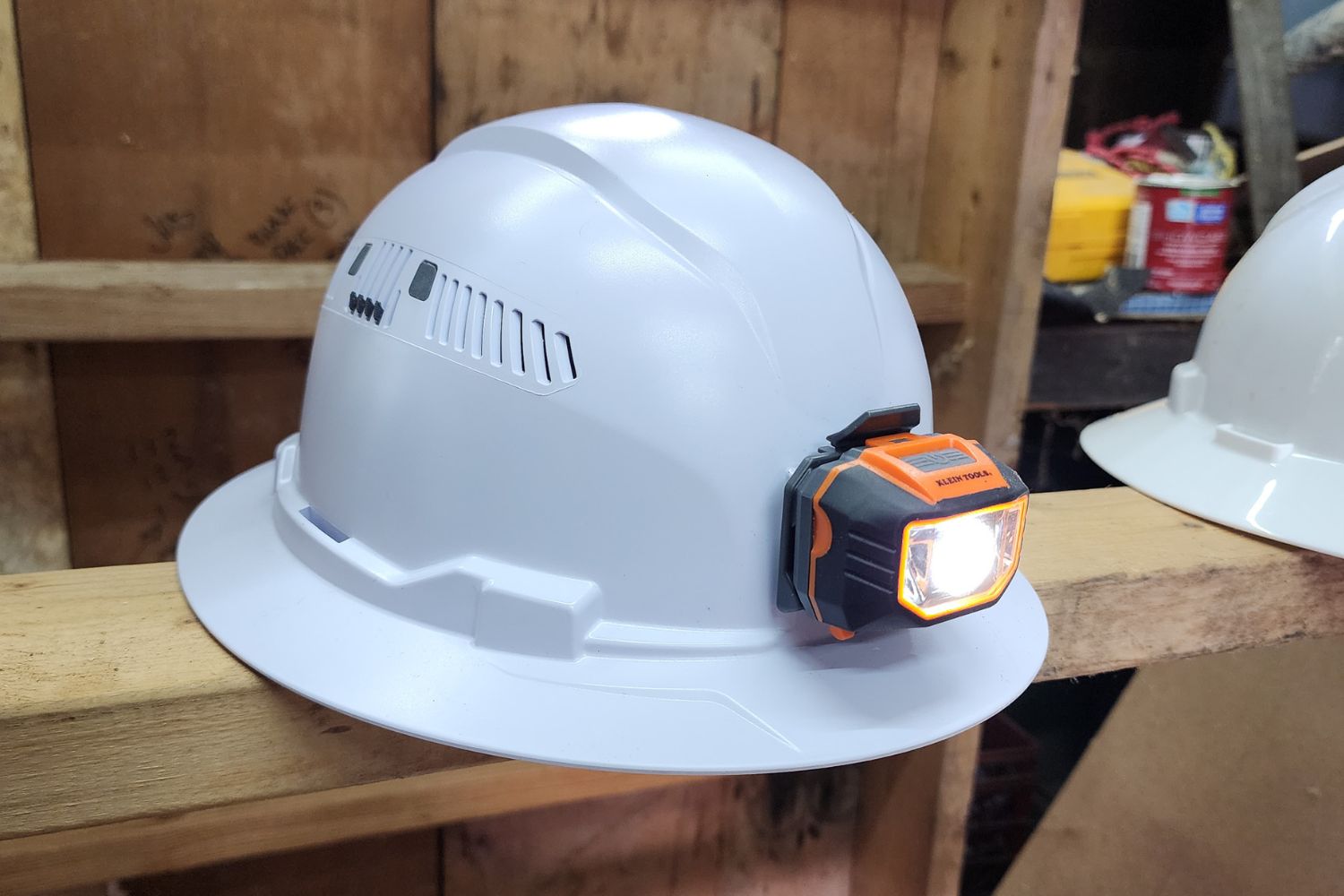
Hard Hats Comparison
| Product | Type/Class | Material | Weight |
| Milwaukee Bolt Vented Safety Helmet | Type 2, Class C | High-density Polyethylene (HDPE) | 1.15 pounds |
| Malta Dynamics 4-Point Ratchet Cap Style Hard Hat | Type 1, Class E and G | HDPE | 0.7 pounds |
| Kask Superplasma HD Safety Helmet | Type 1, Class C | ABS, HD polystyrene, and soft PA nylon | 0.99 pounds |
| Ergodyne Skullerz 8950 Bump Cap Hat | EN 812-2012 | Nylon, ABS plastic, HDPE | 0.5 pounds |
| Pyramex Ridgeline Cap Style Hard Hat | Type 1, Class E, G, C | ABS | 0.79 pounds |
| Klein Tools 60407 Vented Hard Hat With Headlamp | Type 1, Class C | Polycarbonate, ABS | 1.3 pounds |
| Petzl Vertex Vent Helmet | Type 1 Class C | ABS, nylon, polycarbonate, high-strength polyester, polyethylene | 1.08 pounds |
Our Top Picks
Before we expand on the technical aspects to consider while shopping for a hard hat, we’d like to showcase some of our favorite models. The following lineup represents what we deem to be among the best hard hats in their respective categories.
Best Overall
Photo: AmazonWhat We Like
- Protects against top and side impacts
- Comfortable, pressure-free padded suspension
- Accessory-ready with Bolt and universal slots
- Washable and antimicrobial sweatband and liner
What We Don’t Like
- Higher price than basic models
- Slightly heavier than standard hard hats
Specs
- Type/Class: Type 2, Class C
- Material: High-density polyethylene (HDPE)
- Weight: 1.15 pounds
Our Ratings: Comfort 5/5; Adjustability 5/5; Durability 5/5; Value 4/5
The Milwaukee Bolt Vented Safety Helmet stands out for its combination of high-level protection, comfort, and smart accessory compatibility. Unlike standard hard hats, this helmet provides both top and side impact protection, meeting ANSI Type 2 standards as well as European EN12492 climbing helmet requirements. Featuring a 5-point adjustable chin strap, the climbing-style design ensures a secure fit, while the vented shell helps reduce heat during long hours of wear. For added convenience, Milwaukee includes thoughtful touches like a headlamp mount and marker clip, along with multiple Bolt and universal accessory slots for customizing PPE setups.
In testing, the Bolt helmet delivered a noticeable upgrade over budget-friendly models. Combined with a swinging ratchet dial, the padded suspension made it easy to adjust throughout the day, and we experienced no pressure points or headaches, even after a full week of daily DIY use. The antimicrobial sweatband and liner kept the helmet feeling fresh, and both are machine-washable for easy maintenance. While this helmet comes at a higher price point, we think the combination of safety, comfort, and accessory integration makes it a worthwhile investment for anyone who needs reliable protection on the job or in outdoor environments.
What our tester says: “I instantly felt the difference between the Bolt and cheaper alternatives. This hard hat will keep you protected throughout the day, and you’ll forget you’re even wearing it.”—Paul Rankin, Product Reviews tester and writer
Get the Milwaukee Bolt hard hat at Amazon, The Home Depot, Acme Tools, or Red Tool Store.
Best Bang for the Buck
Photo: AmazonWhat We Like
- Affordable price point for budget-conscious users
- Lightweight design at just over half a pound
- Reversible brim with protective low-cut profile
What We Don’t Like
- Brow pad feels non-removable, may rip
- Large brim may obstruct in confined spaces
Specs
- Type/Class: Type 1, Class E and G
- Material: HDPE
- Weight: 0.7 pounds
Our Ratings: Comfort 4/5; Adjustability 3/5; Durability 4/5; Value 5/5
Folks looking to save some money on their on-site headgear may want to check out Malta Dynamics’ 4-point ratchet-cap–style hard hat. This affordable hard hat costs almost half of some other models, yet it’s made with durable HDPE and features a comfortable 4-point suspension system with ratcheting adjustments.
This Type 1, Class E and G hard hat features a lightweight, no-frills design. While it doesn’t have built-in accessory slots, a fancy suspension harness, or vents, it does weigh just 0.7 pounds. Also, the design is reversible for folks who prefer a backward fit. It’s also low temperature- (LT) and high temperature- (HT) approved, which makes it quite a steal at this price point.
It might seem like there isn’t much to the Malta Dynamics 4-point hard hat, but we enjoyed testing it. It’s reversible, which is a good thing since the brim is large and pronounced and could get in the way in a confined space. We also liked that this model stays relatively low along the side of the hard hat, offering more protection for the sides of our heads than those that have a higher cut around the ears. However, we’re not sure that the brow pad is actually removable as the manufacturer suggests.
Overall, for the price, we were surprised by the comfort and low weight, and we think those details make it a great deal.
Get the Malta Dynamics hard hat at Amazon, Zoro, or Hose Warehouse.
Best Lightweight
Kask Superplasma HD Safety Helmet
Buy at AmazonWhat We Like
- Extremely lightweight yet highly protective
- Excellent ventilation with 10 aluminum-grilled vents
- Easy size adjustment with rubberized wheel
- Smooth, comfortable straps against the face
What We Don’t Like
- Higher cost than most safety helmets
Specs
- Type/Class: Type 1, Class C
- Material: ABS, HD polystyrene, and soft PA nylon
- Weight: 0.99 pounds
Our Ratings: Comfort 5/5; Adjustability 5/5; Durability 4.5/5; Value 4/5
The Kask Super Plasma HD earned our pick for Best Lightweight thanks to its slim profile and barely-there feel, all without sacrificing safety. Made in Italy, Kask is known for high-performance helmets across multiple industries, and this model brings that same engineering to the jobsite. At just under a pound, it’s easy to forget you’re even wearing it, yet it still delivers top-tier protection. With 10 aluminum-grilled vents, the helmet stays cool and breathable while keeping debris out, making it especially valuable in hot or dusty environments. The rear rubberized wheel also allows for quick size adjustments, even with work gloves on.
During testing, the Super Plasma HD stood out as one of the most comfortable helmets we tried. Combined with smooth, soft chin straps, the lightweight shell made it easy to wear all day without irritation. Even pressing against the outside of the helmet, the impact dampening was impressive—you don’t feel the shock transfer to your head. While it comes at a higher price than standard hard hats, the superior ventilation, premium comfort, and featherlight weight make this helmet a smart investment for anyone who needs reliable daily protection.
What our tester says: “I liked that this helmet feels at home both as a construction hat as well as protection during outdoor sports. It’s super comfortable to wear for extended periods, and I love all the color options.”—Paul Rankin, Product Tester and writer.
Get the Kask Superplasma hard hat at Amazon.
Best Bump Cap
Photo: AmazonWhat We Like
- Easy one-handed on and off
- Baseball cap style reduces bumps
- Lightweight design prevents neck fatigue
What We Don’t Like
- Less comfortable for extended all-day wear
Specs
- Type/Class: EN 812-2012
- Material: Nylon, ABS plastic, HDPE
- Weight: 0.5 pounds
Our Ratings: Comfort 3/5; Adjustability 4/5; Durability 4.5/5; Value 4/5
The Ergodyne Skullerz 8950 safety bump cap is a lightweight alternative for those who don’t need the full protection of a bulky hard hat. However, it is essential to point out that bump caps do not meet the Occupational Safety and Health Administration (OSHA) Type 1 or Type 2 requirements and are not certified by the American National Standards Institute (ANSI). This model is covered by British and European safety standards.
This Ergodyne Skullerz model is a solid low-profile hard hat ideal for mechanics who are often under vehicles or tradespeople who work in confined spaces. It is designed for areas with the potential to cause painful but not severe injuries.
It has a tough ABS liner that is vented and padded for comfort, comes with a choice of three brim sizes (1 inch, 2 inches, or 3 inches), and features reflective piping around the edge for increased visibility. Although there’s an elasticized Velcro strap at the back for adjustment, it might not be the best hard hat for big heads.
Believe it or not, we didn’t think the Skullerz was the most comfortable hard hat on this list. After about 4 hours of wearing it, we felt a pressure point toward the front of the head, so we ended up taking it off. However, bump caps aren’t really meant to be worn all day, so we don’t hold this against it. As for things we liked, it was very easy to put on and take off quickly, even with one hand. We were also impressed by the streamlined design, as it wouldn’t bump into anything that a standard hat wouldn’t. We liked that it is lightweight, too, which is truly one of the top selling points of this bump cap.
Get the Ergodyne hard hat at Amazon or Acme Tools.
Best for Construction
Photo: AmazonWhat We Like
- Lightweight design prevents neck fatigue
- Easy diameter and depth adjustments for fit
- Ventilation allows airflow and heat escape
What We Don’t Like
- Rubber pad pulls hair and lacks breathability
Specs
- Type/Class: Type 1, Class E, C, and G
- Material: ABS
- Weight: 0.79 pounds
Our Ratings: Comfort 4/5; Adjustability 4/5; Durability 4.5/5; Value 4/5
Construction workers and personnel who need a versatile, all-around capable hard hat may find the right pick with the Ridgeline cap-style hard hat from Pyramex. Made from ABS plastic, this hard hat is very lightweight, allowing users to protect their heads without feeling fatigued. This makes it one of the best hard hats for construction.
Due to its vents, this hard hat is a Class C model with a Type 1 designation. It can be worn forward or backward with the swap of the harness. It has built-in accessory slots, comes in Hi-Viz color, and is suitable for both low and high temperatures.
We liked that this model is lightweight (0.79 pounds), even more so than the full-brim variation. We also liked that it’s easy to adjust in both diameter and depth, as depth adjustments require just tweaking the harness slightly to the side to release the clip—a very easy move. We’re also big fans of the vents, as they really do allow for a lot of airflow, and the reversible design is a significant benefit. One issue we did experience was that the rubber pad in front of the ratchet doesn’t breathe, and it does grab some hair until it gets sweaty.
Get the Pyramex hard hat at Amazon or Industrial Safety Gear.
Best Full-Brim
Photo: AmazonWhat We Like
- Built-in light with magnetic or snap mount
- Adjustable vents control airflow and block rain
- Comfortable foam suspension with strong grip
What We Don’t Like
- Heavier than most standard hard hats
Specs
- Type/Class: Type 1, Class C
- Material: Polycarbonate, ABS
- Weight: 1.3 pounds
Our Ratings: Comfort 4.5/5; Adjustability 5/5; Durability 5/5; Value 4.5/5
While there are hard hats for half the price, we think the Klein Tools 60407 is worth every penny. This model features a ventilated and foam-padded 4-point suspension system that distributes weight over the entire head, resulting in a comfortable fit. It also has built-in adjustable vents that allow the user to choose between no airflow (in rainy conditions, perhaps), full airflow, or any setting in between. It’s a Type 1, Class C hard hat (because of the vents) that’s made from durable polycarbonate ABS plastic.
This model’s clever design solves the age-old problem of saggy, floppy work lights on a hard hat. Its rechargeable magnetic light clips into the accessory slot on the front or the back of a hard hat for reversed wear, but also sticks to metal objects on work sites, making it one of the best hard hat headlamps on the market. This full-brim hard hat also has a ratcheting headband and built-in accessory slots.
The built-in light clip and headlamp are excellent, though they do add a bit to the hat’s heft. Due to the heavy-duty acrylonitrile butadiene styrene (ABS) plastic build and the high-quality light, this hard hat is considerably heavier than most others—and the weight is especially noticeable after wearing it for 8 hours. However, we really liked the adjustable vents, and we found them to be easy to manipulate with ungloved hands while wearing the hard hat.
Since the suspension system is so well designed, it was never really uncomfortable on our heads. The weight was distributed quite well, and the foam padding offered a comfortable grip.
Get the Klein Tools hard hat at Amazon, The Home Depot, or Walmart.
Best for Sport
Photo: AmazonWhat We Like
- Lightweight, versatile design for sport and work
- Six-point suspension conforms comfortably to head
- Dual-strength chinstrap for ground or height use
- Adjustable vents for cooling airflow
What We Don’t Like
- Higher price than standard helmets
- No twist dial, though fit stays secure
Specs
- Type/Class: Type 1, Class C
- Material: ABS, nylon, polycarbonate, high-strength polyester, polyethylene
- Weight: 1.08 pounds
Our Ratings: Comfort 4/5; Adjustability 4/5; Durability 5/5; Value 4/5
The Petzl Vertex Vent is a lightweight, versatile helmet that balances sport-style comfort with professional-grade safety. Built with a 6-point textile suspension, it conforms naturally to the head, keeping it secure and well-balanced. Petzl’s Centerfit system keeps the helmet centered, while the Flip&Fit headband locks into a snug position and folds neatly into the shell for storage. Adjustable vent shutters provide airflow on hot days or extra coverage when needed, making it a practical choice for both outdoor recreation and work environments.
In testing, the Vertex Vent stood out for its all-day wearability. Even without a twist-tightening dial, it stayed snug and secure without creating pressure points or headaches. Smooth straps, a quick-release clasp, and effective venting kept it comfortable during long outdoor sessions—even in Florida heat. At around $100, it’s a premium option, but one that delivers a rare mix of sport-ready comfort and reliable worksite protection.
Get the Petzl hard hat at Amazon, Grainger, or Camp Saver.
ALSO TESTED
None of the following products’ suspension systems met the standard of the rest of the hats, so we do not recommend them.
- The Lift Safety HDC50C DAX Fifty 50 carbon-fiber cap features a sophisticated 6-point suspension system, a self-adjusting strap, and a high-quality carbon-fiber shell, but the suspension tab broke on ours immediately.
- After our other Lift hard hat’s suspension failed, we were extremely careful with the Lift Safety 17KG Dax carbon-fiber cap hard hat. Still, we found that several of the Lift’s suspension tabs (which are metal and very thin) slide off far too easily, while others would not budge whatsoever.
- We also tested the Lift DAX full-brim hard hat in our most recent round of testing to see if the suspension system had improved, but unfortunately, it still fell short. While the shell itself is rugged and heat-resistant, the interior relies on stiff plastic straps with minimal padding. After wearing it for extended periods, pressure points quickly developed, making it one of the least comfortable helmets in our lineup. Given its premium price, we expected better suspension materials and overall comfort—issues that remain consistent across Lift’s hard hat line.
We did some research and found that this is a very common theme with Lift’s suspension systems: the tabs break, slide on or off too easily, or don’t budge at all. Considering their price point, we can’t recommend them.
Jump to Our Top Picks
How We Tested the Best Hard Hats
| Testing Stats | |
|---|---|
| Products tested | 13 |
| Time spent testing | 1 month |
| Tests performed | 2 to 4 |
| Price range | $20 to $130 |
To create our list of the best hard hats, we began by researching over a dozen models from leading safety brands, selecting only the standout models for hands-on testing. Every helmet we tested met ANSI (American National Standards Institute) safety standards except the bump cap, which is not designed for impact protection. Our focus was on comfort, adjustability, ventilation, weight, durability, and accessory compatibility. Each helmet was worn for a full workday to evaluate real-world performance, with close attention paid to suspension design, pressure points, and ease of adjustment. We also tested specific features, such as accessory slots, chinstraps, vents, and padding, to see how they affected usability. Only the top performers earned awards, though we previously tested other solid helmets—including the JSP Evolution Deluxe 6161, MSA V-Gard, and Pyramex Ridgeline—which remain dependable alternatives even if they didn’t make this year’s list.
| Product | Comfort | Adjustability | Durability | Value |
| Milwaukee BOLT Vented Safety Helmet | 5 | 5 | 5 | 4 |
| Malta Dynamics 4-Point Ratchet Cap Style Hard Hat | 4 | 3 | 4 | 5 |
| Kask Superplasma HD Safety Helmet | 5 | 5 | 4.5 | 4 |
| Ergodyne Skullerz 8950 Bump Cap Hat | 3 | 4 | 4.5 | 4 |
| Pyramex Ridgeline Cap Style Hard Hat | 4 | 4 | 4.5 | 4 |
| Klein Tools 60407 Vented Hard Hat With Headlamp | 4.5 | 5 | 5 | 4.5 |
| Petzl Vertex Vent Helmet | 4 | 4 | 5 | 4 |
What to Consider When Choosing a Hard Hat
There’s a lot to think about when choosing a hard hat. The safety they provide is a key consideration, of course, but comfort is another crucial factor, especially if the hat will be worn all day or paired with other safety equipment like hearing protection. Keep reading to learn about some key factors at play when selecting the right hard hat.
Types and Classes of Hard Hats
In the U.S., OSHA requires employers to provide hard hats for those working in certain environments. The standards for those hard hats are set by ANSI. To be approved by OSHA, the hard hat must meet ANSI/ISEA Z89.1-2014 (ISEA is the International Safety Equipment Association) and ANSI 1926.100. These standards cover type, class, and other details.
There are two types of hard hats:
- Type 1: Protects the top of the head.
- Type 2: Protects from side and off-center impacts as well as the top of the head.
Hard hats are divided into one or more of the following classes:
- Class G: General purpose, which also protects against electric shock up to 2,200 volts.
- Class E: Electrical, which protects against electric shock up to 20,000 volts.
- Class C: Conductive, which offers general-purpose impact protection but no protection against electric shocks.
Hard hats may have one or all of these features:
- A reverse donning arrow indicates that the hard hat can be worn forward or backward. Hard hats are sometimes reversed if the wearer finds the peak is an obstruction in confined spaces or to allow for a face shield or a welding helmet if the peak interferes with the fit.
- LT indicates suitability for low temperatures (down to -22 degrees Fahrenheit).
- HT indicates suitability for high temperatures (up to 140 degrees Fahrenheit).
- HV indicates high visibility.
Work Type Color Code
A color system exists that relates either to the job being undertaken or the type of person wearing the hard hat. These are not a legal standard or a requirement, and they have no impact on those buying a hard hat for use at home, but they may be relevant for those who are asked to supply their own personal protective equipment (PPE) for the jobsite.
- Yellow: a catch-all color for tradespeople and laborers
- White: site forepersons, supervisors, managers, architects, surveyors, and engineers
- Red: firefighters and fire marshals
- Orange: crane/lifting gear operator, road crews, and traffic marshals
- Blue: electricians and carpenters
- Green: building or safety inspectors, occasionally trainees
- Brown: welders
- Gray: site visitors
Material and Design
All hard hats for sale in the U.S. should be either Type 1 or 2, since both of these provide a minimum standard for protection. However, there’s no doubt that some materials are stronger than others, and this may affect a shopper’s choice.
- High-density polyethylene (HDPE): A low-cost, lightweight material usually found in budget hard hats. It’s tough but can be subject to cracking.
- Acrylonitrile Butadiene Styrene (ABS): Another tough, affordable material. However, it doesn’t have high solvent resistance.
- Fiberglass: Typically produced through a laminating process that provides great strength. Fiberglass hard hats cost more to make, and therefore more to purchase. Plus, they can be comparatively heavy.
- Carbon fiber: A lightweight material with extremely high strength and stiffness, but also brittle, so it is usually combined with resin. The result is a high level of protection from impact and good electrical resistance, but an expensive price tag.
- Phenolic resin: A very hard synthetic polymer often laminated with fiberglass. Its main advantage is having heat resistance of up to 350 degrees Fahrenheit.
In terms of design, the most obvious difference is whether the hard hat has a peak or a full brim. While full-brim models offer a wider area of protection from falling debris, some wearers find the size increase inconvenient. In technical terms, it makes no difference to the ANSI standard, so it is a matter of personal preference in most cases.
Size, Comfort, and Suspension System
To ensure a hard hat provides the maximum level of protection, it’s important to purchase the correct size. Measure the head by placing a flexible measuring tape slightly above the ears and around the circumference of the skull, then consult one of the many online hat sizing charts to determine the correct size to order. Hard hats don’t usually sit directly on the head because impact energy would be transferred directly to the skull, which could cause a concussion or even a skull fracture. Instead, they are designed with a suspension system that provides a gap between the head and the hard hat’s interior.
Generally speaking, the more adjustment points available, the better the possible fit and the more comfort provided. The main adjustment is usually a knob at the back of the hard hat, which loosens or tightens a brow band. A padded sweatband may be incorporated as well.
A proper fit isn’t just important for safety and comfort. If safety glasses must be worn, as is often the case, it is important that the hard hat doesn’t sit too low and interfere with them.
Weight is another consideration, particularly if the hard hat is worn all day or the wearer is involved in a trade that requires moving the head frequently—a crane operator, for example. A heavy hard hat would be uncomfortable by the end of the day and would likely cause neck pain.
Additional Features
- Hard hats may be vented to aid airflow and cooling, although in some environments, this can allow dust and debris to reach the wearer’s head. Vented hard hats often don’t meet Class G or E electrical requirements.
- Accessory slots or lugs may be provided on the sides of the helmet. These allow for the fitting of neck shades, sun shields, ear muffs, chin guards, face shields, headlamps, or welding masks.
- In cold weather, it may be inconvenient to wear a winter hat and a hard hat together. Thermal fleece liners are a popular solution, but are rarely included with a hard hat.
FAQs
If the hard hat is for personal use, you can wear whatever color you prefer. In professional environments, colors are often used to define particular roles (see above for more info).
Class C does not protect the wearer from electrical shock. The C stands for “conductive,” so these hats provide impact protection only.
It very much depends on the intended use. Lightweight HDPE models can be $10 to $15, and full-brim carbon fiber hard hats can top $150.
Manufacturers usually recommend replacing a hard hat every 5 years, though some say as frequently as every 2 years. If you notice cracks or dents, replace the hard hat immediately. A visual inspection should be carried out every time the hard hat is about to be worn.
Only wear a hard hat backwards if there is a “reverse-donning arrow” marked inside the hat, which looks like two arrows following each other in a circle. This indicates it can be worn either way. Without that mark, safety will likely be compromised if the hat is worn backwards.
There is no firm expiration date for hard hats, but safety organizations and most manufacturers recommend that hats be replaced after a maximum of 5 years. Some of the best hard hats have the date of manufacture stamped inside.
The best class depends on your work environment. Class E protects against high voltage, Class G covers general use, and Class C prioritizes comfort.
Full-brim hard hats offer added protection against sun, rain, and debris, making them ideal for outdoor use, though they can be bulkier than cap styles. They may be less useful if you work in close areas where the brim might bump against materials or block your ability to see what you’re working on.
A hard hat should fit snugly without causing pressure—secure enough not to fall off, but comfortable enough for all-day wear.
Vented hard hats enhance airflow and comfort in hot conditions, but are not rated for electrical protection, which limits their use on certain job sites.
Meet the Testers
Paul Rankin is a freelance writer and product tester with years of experience covering home improvement, tools, and DIY projects. He has hands-on tested dozens of products for major outlets, including protective gear like hard hats, to help readers understand how they perform in real-world conditions. His goal is to give readers clear, reliable advice they can trust when choosing the right gear for the job.
Tom Scalisi is a freelance writer specializing in the home design, construction, tools, and automotive industries. He has been involved in the trades for over 15 years as both a contractor and a commercial building mechanic. As a lover of all things tools, construction, and DIY, he’s always looking for new tools and techniques while also sharing his knowledge with the DIY world.
Additional research provided by Bob Beacham.
